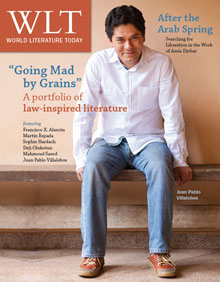Tomboy by Thomas Meinecke
Daniel Bowles, tr. Las Vegas, Nevada. AmazonCrossing. 2011. ISBN 9781611090574
 Vivian Atkinson, the eponymous protagonist of Thomas Meinecke’s 1998 novel, is the child of a German mother and an American father, an ardent fan of indie music, and a student of gender theory at the University of Heidelberg. Tomboy follows Vivian and her circle of gender-bending friends, dedicated followers of fashion, pop culture, and “the more or less deconstructionist works of younger, primarily American feminists,” through their everyday life pursuits: writing master’s theses and dissertations, biking along the Neckar river, clubbing in Mannheim, and making a pilgrimage to Munich to see a lecture by the feminist philosopher Judith Butler. Taking its central cue from Butler’s theory of gender performativity—outlined in her influential 1990 book, Gender Trouble—Meinecke’s text explores a variety of nonnormative gender performances and sexual practices, embodied in the novel by Vivian’s friends.
Vivian Atkinson, the eponymous protagonist of Thomas Meinecke’s 1998 novel, is the child of a German mother and an American father, an ardent fan of indie music, and a student of gender theory at the University of Heidelberg. Tomboy follows Vivian and her circle of gender-bending friends, dedicated followers of fashion, pop culture, and “the more or less deconstructionist works of younger, primarily American feminists,” through their everyday life pursuits: writing master’s theses and dissertations, biking along the Neckar river, clubbing in Mannheim, and making a pilgrimage to Munich to see a lecture by the feminist philosopher Judith Butler. Taking its central cue from Butler’s theory of gender performativity—outlined in her influential 1990 book, Gender Trouble—Meinecke’s text explores a variety of nonnormative gender performances and sexual practices, embodied in the novel by Vivian’s friends.
A well-known experimental rock musician and the author of six novels, Meinecke is among the most successful writers of the German genre known as Popliteratur. With its origins in the pop movement of the 1960s, German pop literature experienced a revival in the 1980s when the influential Suhrkamp publishing house signed Meinecke and his colleagues Andreas Neumeister and Rainald Goetz, publishing their novels under the imprint “pop.” After German unification, pop literature boomed, both because it conveyed the Zeitgeist of the 1990s and because it allowed a new generation of writers to break from the aesthetic and political tendencies of postwar German literature in the Federal Republic and the GDR. Characterized by bricolage, pastiche, and remixing; entertaining stories about youth culture; and an emphasis on consumer discourse, pop literature has been immensely influential in Germany for several decades, but hardly a single example of this successful trend has been made available in English.
Enter AmazonCrossing, a new publishing venture of the bookselling behemoth Amazon.com, whose laudable aim is to promote popular world literature to English-speaking readers. AmazonCrossing commissions translations in part by tracking interest in specific titles across its various foreign-language websites, and many of its early successes have come from German literature (particularly crime fiction). Meinecke seems like a perfect match for AmazonCrossing: he is a successful author with a cult following, whose pop-driven works should appeal to both the iPad-and-Kindle demographic and readers interested in smart books from abroad.
How disappointing, then, that Tomboy is such a challenge to read in English. The translator’s choice to render verbatim Meinecke’s German sentence structures, adverbial phrases, and nominalizations contributes to this unreadability—a choice a good editor might have cautioned against. To be sure, the novel is a translator’s challenge. Meinecke describes his own writing style as akin to the sampling he performs as a DJ in Berlin clubs. Tomboy lacks any conventional plotline and contains only scanty dialogue; instead, it consists of a steady stream of references to the landscape of the Odenwald region, “riot grrrl” bands of the Pacific Northwest, the history of the chemical concern BASF, and post-Lacanian psychoanalysis, an admittedly arcane frame of reference that, in the German original, delighted some readers and irritated others. Thomas Meinecke’s style and themes may not be for everyone, but hopefully Tomboy will pave the way for more seasoned translations of German pop literature in the future.
Hester D. Baer
University of Oklahoma

